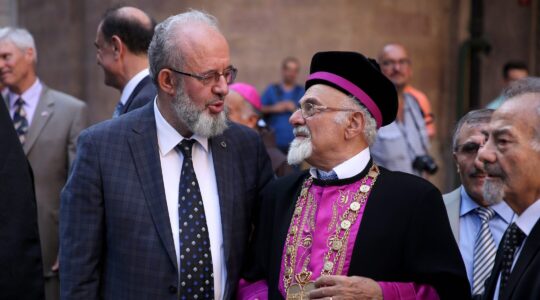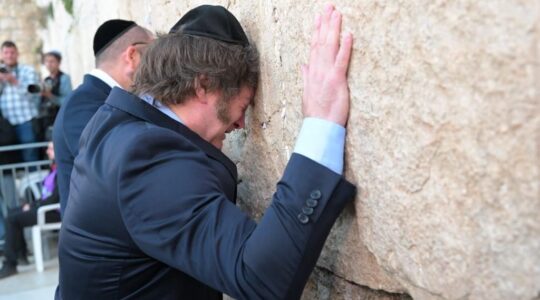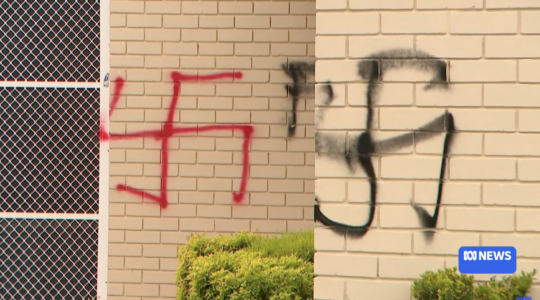 Leaving Hannaton last night, I hitched a ride back to Tel Aviv with Steve and Judy Gray. Judy, it should be noted, is the true winner of TWJ’s iPod contest, having penned the entry about Hannaton that garnered the most votes.
Leaving Hannaton last night, I hitched a ride back to Tel Aviv with Steve and Judy Gray. Judy, it should be noted, is the true winner of TWJ’s iPod contest, having penned the entry about Hannaton that garnered the most votes.
She and Steve made aliyah to Israel in the late 1970s and, after a stint on a kibbutz, wound up as part of a Conservative/Masorti congregation in Jerusalem’s French Hill neighborhood. They are also among the first 20 families to buy homes at Hannaton in an effort to revitalize the kibbutz (I’ll have more on that in the next few days.)
Both are quite fairly described as movement machers. Steve serves on the boards of the Israeli Masorti movement and the Hannaton Educational Center, as well as the kibbutz secretariat. Judy worked for Masorti Olami, the Conservative movement’s international wing, for years. And that’s just what I remember.
The Grays reminded me of so many other American couples of their generation that I’ve gotten to know over years of living and visiting Israel, people who typically left comfortable suburban lives in America and planted themselves in Israel in the wake of Israel’s stunning victories in ’67 and ’73. And they reminded me so little of the families I met last week on the Nefesh B’Nefesh aliyah flight, families whose mothers were more likely to be sporting head coverings and long denim skirts than touting their liberal Jewish bona fides.
From my entirely unscientific survey of those 210 folks who landed in Israel last week, I think it fair to conclude that to the extent that there was a liberal/secular presence — and I’d be lying if I said there wasn’t one — it was highly concentrated among the young. Several people familiar with aliyah trends have confirmed this.
Which is partly what gives the project underway at Hannaton a sense of broader import. Israelis invariably associate religious Judaism with Orthodoxy. When I lived here, I frequently confounded shopkeepers by asking if their food was kosher, who then stood on tippy toes to see if I was wearing a yarmulke. Failing to find one, they invariably flashed me a quizzical expression. It simply didn’t compute.
Probably half a dozen times, the Hannaton-niks told me about how, over the high holidays, the secular community that abuts the kibbutz refused to participate in their egalitarian services. Instead, they invited in a Chabad rabbi to conduct the holiday services for them. They want the synagogue they never go to to be Orthodox, many noted with derision.
One gets the sense that Hannaton’s new members see Israeli society as having taken a wrong turn somewhere. Steve confessed to me half in jest (at least I think it was half) that he is pessimistic about Israel’s future. Another member said he and his wife had come to Hannaton because they were unable to find a community to their liking in Jerusalem (Jerusalem!). And tonight over dinner, a friend who made aliyah around the same time and whose religious convictions more or less align with the Grays was even more blunt.
"A lot of us are disillusioned with life here," he said. "This is not the Israel we came to. When I used to walk though shuk Machane Yehuda, I used to say, ‘These are my people!’ Now I say, ‘These are my people???’"
Hannaton aims to change all that. The kibbutz’s goals are multifaceted and sometimes hard to follow, but they essentially boil down to promoting an alternative model for how religious-secular relations can be managed in the Jewish state. When I asked Rabbi Yoav Ende, the charismatic young rabbi spearheading the revitalization effort, for a succinct statement of intent, I got this: "My vision is to have here a religious, pluralistic, Conservative community that will be on one hand very religious, very connected to its Judaism, and on the other hand very much connected to its society."
Edne told me he would consider the project a success if he can attract dozens of young families to the kibbutz in the coming years, enough to maintain a daily minyan. But I’d think an equally appropriate, if more ambitious, metric would be whether he can help make Israel again a place in which the vast majority of American Jews who don’t consider themselves Orthodox would consider living.
JTA has documented Jewish history in real-time for over a century. Keep our journalism strong by joining us in supporting independent, award-winning reporting.





